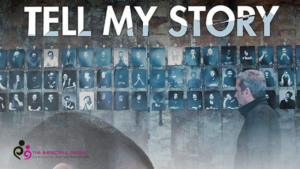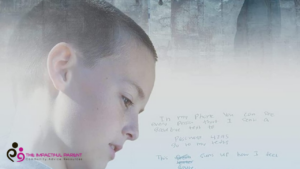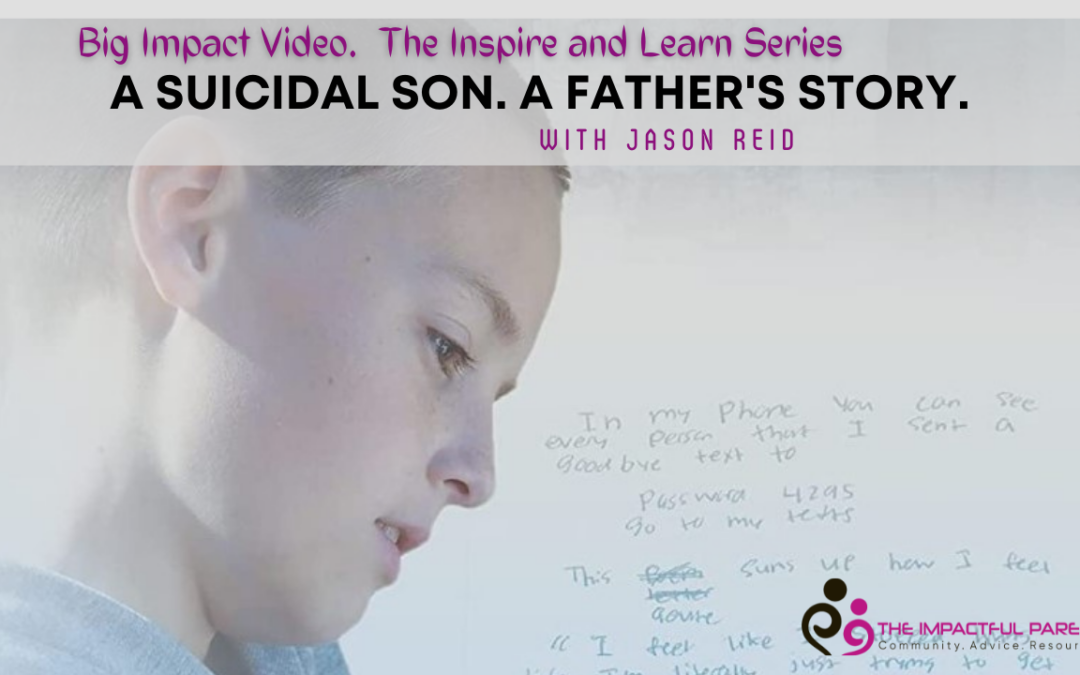A Suicidal Son. A Dad’s Story.
A suicidal son. Jason Reid’s story is powerful & unforgettable. After Ryan took his own life, Jason is encouraging mental health awareness. Watch Video by clicking the above photo or read the transcript below.
Transcript for A Suicidal Son. A Dad’s Story:
Kristina: Welcome, Jason Reid. Jason will talk to us about the importance of paying attention to your child’s mental health.
Jason is a very successful entrepreneur, but his life changed and flipped upside down in March 2018 when his son, Ryan, took his own life. Today, Jason is the founder of chooselife.org. An organization focused on ending teen suicide by helping parents own their child’s mental health. He has an amazing short documentary called Tell My Story, which is Ryan’s last request to his family. Thank you for being on stage, Jason.
Jason: Thank you for having me here.
Kristina: Let’s start with your story. Tell us about what happened and how you got here.
Jason: Yeah. Well, let me start by saying, never in a million years did I think it’d be here. My life was on track. It was great. My wife and I have four kids. Ryan was the youngest. He just turned 14. Kim and I were away for her birthday weekend. We had dinner that night talking about how great our life was.
And that night, after getting back from dinner. Ryan texted all the family members individually to say goodbye. Then he took his own life at our house. It was something I never expected. And it’s something that I always thought happen to other people. It doesn’t happen to people like me.

A Suicidal Son. A Dad’s Story.
That is the fallacy that we all live by; this kind of thing happens to other people. We think that kids who take their own life come from poor families. They come from bad families. They have some trauma in their lives that caused them to think that way, to do those kinds of things, and that’s not what happens. I can guarantee you that Ryan’s life was not that way. In fact, he got straight A’s, he was a great kid, and everybody loved him. He’s funny. And there were no signs. At least, I didn’t think there were signs.
There were signs, though. I just didn’t know what to look for because I have never focused on my kid’s mental health. I didn’t think I had to.
A few weeks after Ryan passed, I was going through his drawers searching…. searching for something, and in the top left drawer, I found a note. I opened it up. The note said, “Here’s my username and passwords. Tell my story.”
Kristina: That was Ryan’s last request then. That is so powerful.
Jason: What I’ve done since Ryan’s death, I’ve been on a journey to discover what went wrong for me and how I can stop it from happening to other parents, like you.
So I did a movie called Tell My Story. I’m not gonna lie. It’s a hard documentary to watch. In the movie, I talked to parents and kids across the West Coast, that experienced this and got their stories.
Kristina: And what did you learn in that process? What was the message that came across that these kids want their parents to do?
Jason: It’s a great question. They want you to do the opposite of what you think you should do. They want you to ask questions, listen, love them, not judge them, and not try to fix them. That’s what I learned, amongst a whole bunch of other things.
I’m a CEO. I own companies across the United States. I do a whole bunch of different things. I’ve been very successful. I’ve written a bunch of books. None of that stuff matters now.
I fix things for a living. I coach CEOs. People come with problems, and I fix them. Tell me what’s going on in your life. I’ll tell you how to fix it. (My wife hates that about me, lol.)
The problem is, that is what I wanted to do with my kids too. If a child comes up to me and says, I broke up with my girlfriend. I’m really sad, and I hate this. I can’t deal with it,” my natural reaction is to say, “It’s not that bad. There’s a bunch of people out there. You’re only 15. It doesn’t matter. You’re going to go through 100 other people in your life before you get married. Don’t worry about this.” I think other parents are similar. I hope other parents hear me right now because I need to tell them that this was one of my big mistakes.
I know parents want to help their children, but that isn’t the way to do it. In fact, the minute that you start telling them that their problems aren’t too bad, the less likely they’re going to tell you anything.
Kristina: We need to validate how they feel.

A Suicidal Son. A Dad’s Story.
Jason: Exactly. In their world, those problems are the most important things. It may be insignificant for us, but to them, it means a lot. Your child will shut down if you don’t give their problems significance.
Also, children can’t cope as well. Their lives come crashing down around them because they haven’t developed coping skills yet. They don’t need a lecture. They need love and support.
The biggest thing I’ve learned is that we can reverse what’s going on here. This trajectory of suicide going up and mental health problems going through the roof can be fixed. We can absolutely change the path, but it’s not the way you think we’re gonna change it. It’s going to be us, as parents, who change. We need to own our kids’ mental health the same way we own their physical health.
When your child has a stomach ache, you take them to the doctor. We need to treat children’s mental health the same way. If your child comes to you and says, “I’m depressed, and I’m sad,” we have to take the time to talk to them and possibly get them professional help.
I’ve never been depressed. I don’t understand it. I know it’s okay to be sad. I get sad, but the difference between being sad and being depressed is, you get sad for a day. You get depressed for days on end. Even though I don’t understand depression, I learned that it is still something to take seriously. Parents can’t ignore it.
I learned that one person might look outside the window and see sunny skies while someone else might look out the same window and only see clouds. I learned that there’s nothing I’m going to say to make them believe those clouds don’t exist. The correct answer I’ve learned is, tell me about those clouds.
What do those clouds look like? Explain it to me. Describe them to me. Why do you think the clouds are there? Ask questions and listen. Don’t judge. Don’t tell them how much their life is so much better than they think it is. They don’t want to hear it, and they’re not going to hear it. Instead, parents need to take their child’s sadness seriously, listen to their problems, and get them to help if needed.
That’s how we own our kids’ mental health. We get kids to talk and share how they feel. Talk about those clouds in the sky and describe them to us and tell us why they think they’re there and ask if there’s anything to help make them go away.
Kristina: Yes. And if they say there’s nothing we can do, then you sit and listen more.
Jason: And if you are worried, don’t be afraid to ask the question: How bad is this? Have you thought about hurting yourself?
Kristina: You can’t be afraid to ask those questions. You’re not putting the idea in their head. You’re being a concerned parent. You have to ask directly, How do you feel right now? Do you feel like you want to hurt yourself?
Jason: Are you feeling that way now? Did you feel that way in the past? Tell me about the last time you felt that way?

A Suicidal Son. A Dad’s Story.
If they say they want to hurt themselves, ask more questions. Do you have a plan? How long has this been happening?
Kristina: Parents, you could take your child to the emergency room of any hospital. They will assess your child to see how far into the process of wanting to hurt themselves that they are on. It could be the most important hospital visit that you’ll make. The hospital may end up saying it’s not critical and send you home but, it’s still showing your child you care enough to take them there.
If your child is evaluated and considered a suicide risk, the hospital will send your child to a place where they can stay for a few days and not hurt themselves. Those special hospitals will have therapists on staff. Your child will be monitored 24/7, and your child will be in a special section of the hospital reserved for children under 18.
I’m gonna ask you, Jason, were there any warning signs for Ryan?
Jason: I wish I could say that there weren’t any warning signs for Ryan, but it is more realistic to say that I missed them. I have to live with that every day, and it pains me, but I missed them.
Ryan was more withdrawn. He spent more time in his room. He was quicker to snap than he used to be. I thought he was just a grumpy kid. I thought he was a grumpy teenager. My other teens were grumpy, too, so I dismissed that as a sign. Ryan also was physically ill because he had Crohn’s disease. I figured a lot of his anger was around that, but it probably wasn’t.
I never took the time to really ask him what was going on.
I asked him how you are doing, and he would say fine, so I took his response at face value. That is a big mistake we make as parents. We don’t talk to our kids.
So, looking back on it, I could have done a much better job of talking to my kid. And don’t get me wrong, I had a great relationship with Ryan. We hung out together. We traveled together. We were planning our trip to Washington in the summertime, just the two of us. Those plans were made the week before he died for the following year. We had a great relationship.
Now, I’d like to give you a few tips. I know many people are probably saying, I want to talk to my kids, but they don’t want to talk to me. I get it. So let me tell you a couple of things that I’ve learned from that.
The first thing is, as parents, we have a tendency to want to talk to them when WE want to talk. That’s not going to happen. They’re only going to talk to us when THEY want to talk to us. And it’s inherently inconvenient when they want to talk to us. So the first thing you don’t want to do is barge into their room and demand a conversation. By the way, I know you own the house. I know you pay for everything. I know that everything in that room you bought. I get it. But when we barge into that room, your child feels violated. That’s the only little sacred space they have. That’s all. Yeah. And now you’ve just barged in.
You know your kids. You know there are times when they’re gonna want to talk to you and when they don’t. Talk to them on the drive to school, the drive home, while you’re making dinner, go for a walk, invite them to a sporting game, whatever your child wants. Don’t try to get him to talk when they don’t want to talk. They’re not going to. That’s when you get the “I’m fine” only.
Then, capitalize on the time when they do want to talk and go deep. Put down your cell phone, and cancel a phone call or night out. If your child is willing to talk to you, talk to them. Your child may only be willing to open up and talk to you once every couple of weeks. Seize those moments! Ask questions and listen. And the more you ask questions, listen, do not judge them, and not lecture them, they will talk to you more.
Here’s another mistake I made. I showed up as a guy who had it all figured out. Let me explain.

A Suicidal Son. A Dad’s Story.
I’ve got companies. I’ve written books. I’m a black belt, Iron Man kind of guy. I am CEO, yada yada yada. It doesn’t matter. I never cried in front of my kids. I showed up as everything is good. In reality, I have failed dozens of projects over the years. I have been nearly bankrupt two or three times. I questioned whether I’m enough to do what I do. But that’s not what Ryan saw. That wasn’t how I showed up to my kids and my family. My wife never knew all the stuff I was going through. I kept it from my family. Why? I wanted to make sure my family had a good life.
Unfortunately, Ryan saw me as the guy who always had it figured out. He thought I never had a problem and never cried. When Ryan had a problem, Ryan cried. Ryan had fears. Eventually, Ryan thought that something was wrong with him. So, my advice is to share your feelings with your kids. Share what you’re going through. They need to understand that life isn’t great all the time. It’s okay to have a bad day at work. It’s ok to have your boss yell at you because you did something stupid. It’s ok to feel sad.
Lastly, remember that when kids go so far as to take their own lives, they don’t want to leave you. They don’t want to die. They want the pain to go away. Usually, the pain is so strong that it overcomes their willingness to stay here.
Oh- and one more quick thing! Regarding social media, all the kids I talked to said that social media was a terrible place for them. Their brains can’t understand that someone’s beautiful post is not real and that beautiful post doesn’t really represent that person’s real life. They assume that everybody’s life is awesome besides theirs. Plus, most kids get bullied on Instagram and bullied on Facebook. I would think twice about giving my kid a social media account. I also believe that the parent owns that phone. You have the right to see it anytime you want.
And the final piece on that from my end is that I do not believe that a child needs a browser on their phone before age 15. Take the browser off the phone, or get an app to block the browser. Why do I feel that way?
It’s pretty simple. I didn’t think about the browser on the phone I gave Ryan. He was a good kid. I wasn’t worried about him searching for things he shouldn’t. I wasn’t worried about porn or rated R content. I didn’t think Ryan would do that, and he didn’t. Ryan used that phone to take his own life. He researched different ways to kill himself on that phone. So, take the browser off the phone.
Kristina: I’d like to know where families can go for support. If they’re resonating with your story and want to watch your short documentary, where should they go?
Jason: There is a lot of local groups that provide support. I would start there. Google support groups for families. Chooselife.org has my Ted Talks and links to the movie. Everything you want to search for you will find online. It’s amazing. You will find many great organizations. Do your research for help specific to your needs. And to watch Tell My Story, go to tellmystoryfilm.com
Kristina: Thank you so much for being here today, Jason.
—————–A Suicidal Son. A Dad’s Story.—————————————
What to do next:
- Follow The Impactful Parent on social media if you don’t already! Facebook, Instagram, LinkedIn, & Pinterest
- Subscribe to the PODCAST and/or the YOUTUBE CHANNEL! Podcast link & YouTube link
- Check out the official website of The Impactful Parent for FREE RESOURCES, parenting classes, mom’s groups, and so much more! Click here to check it out!
- Discover how you can work with Kristina! Sign up for a FREE 30-minute discovery call! Click here to find a time that works best for you!

